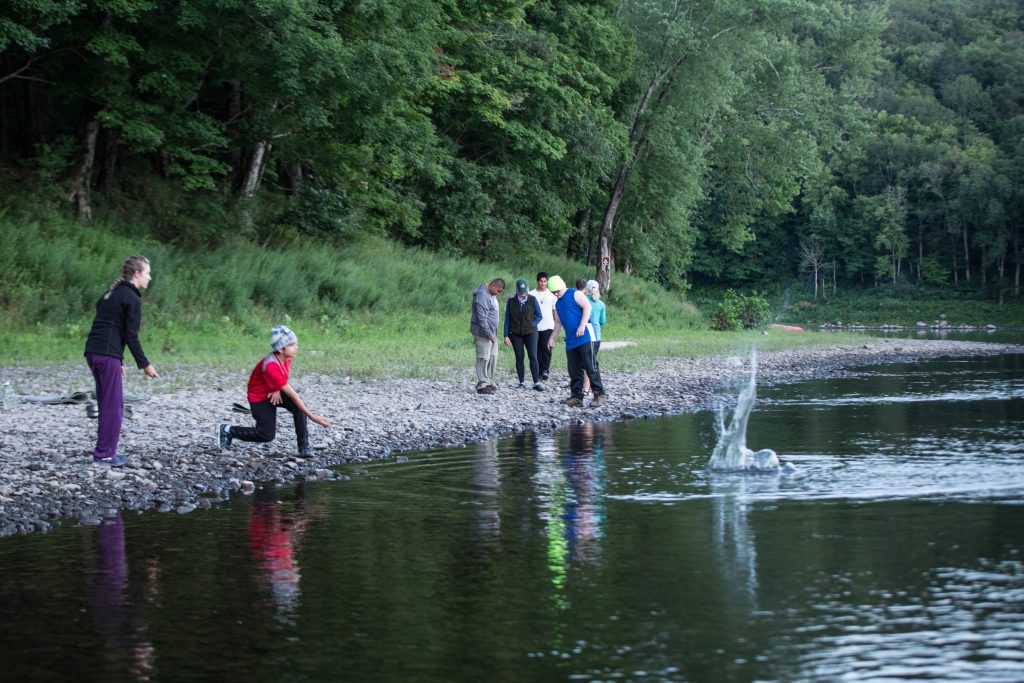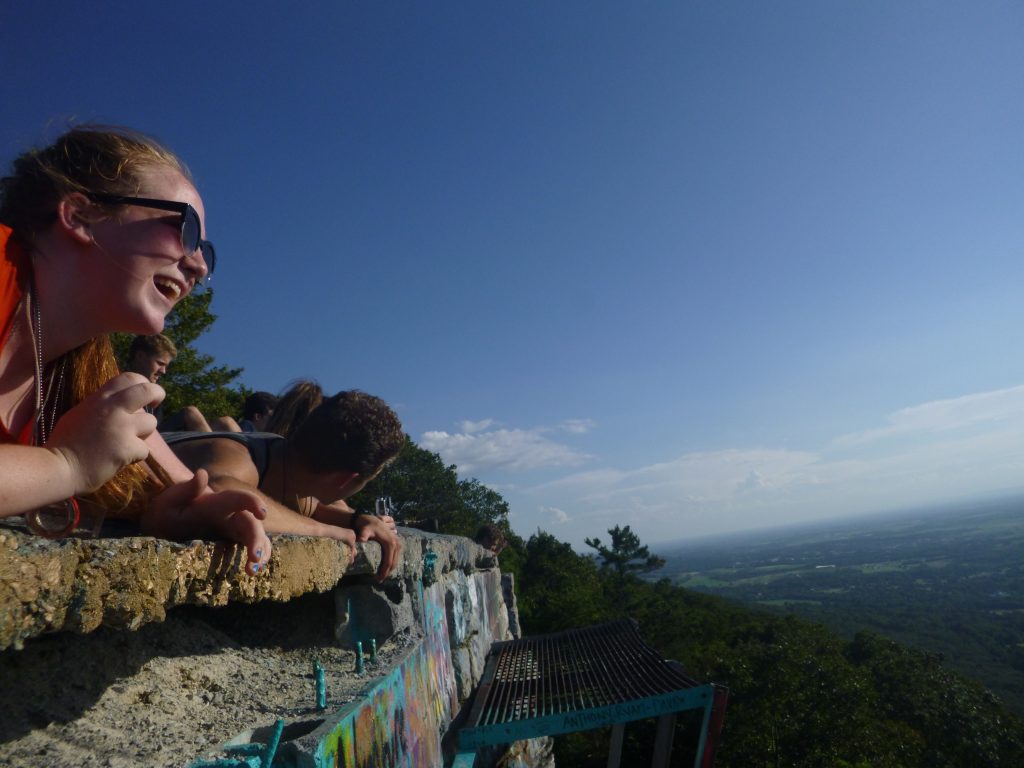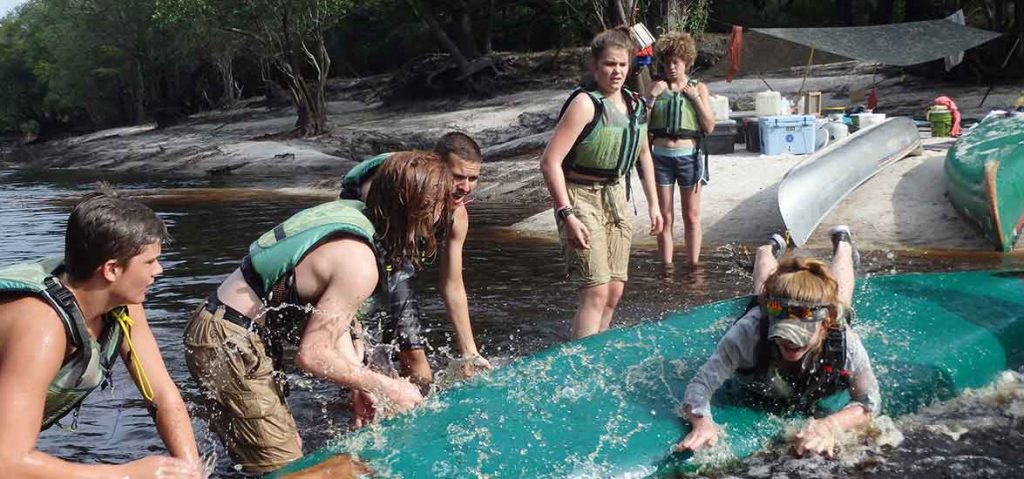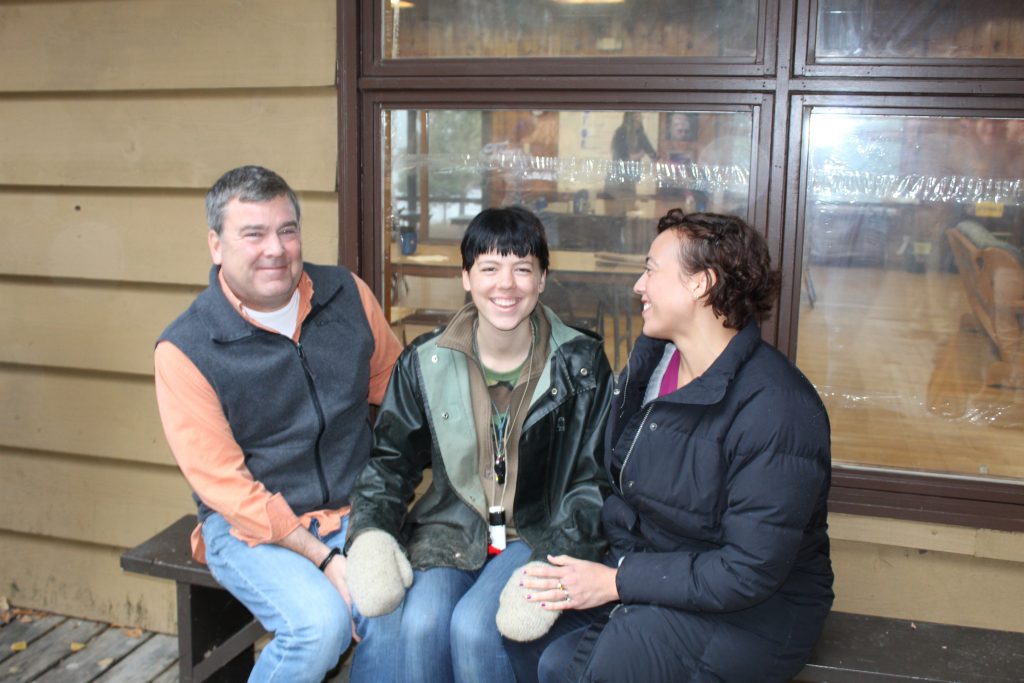When we’re in the wilderness, we’re in session 24 hours a day. As Instructors, we strive to find the balance of when our students are ready to learn, when they’re ready for a challenge and when they need a break. When we take the time to provide breaks to stop to play, we see rewards in attitude and willingness to participate in work afterward. Play can be a preventative tool, lowering stress levels before someone hits their breaking point, and also a restorative tool, helping everyone get back to their baseline and laugh a little after an emotional moment.
We’re doing serious work—changing lives—and we don’t shy away from it. But the wilderness isn’t just another venue for pushing past our limits, it’s also our playground. When we’re watching shooting stars, picking blueberries or trying to catch a painted turtle, the more we engage with our surroundings in fun, the more balance our expedition has. Seeking fun in tough moments becomes a transferrable skill for whatever tough times are ahead after the trip is over, and the turtle has been named and released.

Photo by Ryan Harris
Teens Need Outlets to Unwind
As they grow, many teens scorn games and organized fun, but still need outlets to play and unwind. We have to be more creative in making space for fun, or they’ll choose their own, less-than-ideal times for fun, when dinner is burning on the campfire, or when others are trying to sleep at the end of a long day. If the focus remains constantly on work that needs to be done, teens get bored. By scheduling in time to play, we can set the team up for greater success in the long run. The benefits of fun outweigh any architecture work prepping and convincing teens to participate.
As part of their need for fun, teens also crave risk. As the adults in their lives, we can choose to provide healthy risk-taking opportunities, such as rappelling off of a cliff (high perceived risk, low actual risk) or paddling on a windy day (after tying down and stowing loose gear). Some teens compare their expedition to video games—the closest parallel to an adventure that they know of. For many, though the experience is hard work, it’s also the most exciting and risky thing they’ve done.

Photo by Kevin Neff
Certain initiatives can appeal to the survival enthusiasts, like building rafts, fires or forts. Some of the things I did as a child on my own are completely new to teens who haven’t spent much time outside. Developmentally, they’re children when it comes to this type of play, and they need time and space to explore. It’s also important for teens to see you break a few of your own rules for the sake of fun, to allow them to knock over a dead tree when you would usually require them to only pick firewood from already fallen ones, or to eat a bunch of cookies for dinner.
We’re in It with Them
On an Intercept expedition, we’re in the business of pushing our students to be their best selves and do serious work on relationships, honesty, communication and future planning. It’s important to show them our humanity, or we run the risk of becoming unapproachable. By temporarily setting the difficult conversations aside for a rock-throwing contest or to go fishing, we help them see that we’re in it with them, eating the same food, doing the same work and needing the same break. Barriers and defenses may go up when it’s time to deliver difficult feedback or take ownership for a mistake. Taking time to laugh and play lowers our defenses, and allows us to connect as people who care about each other. It may be many years before a teen can understand how rules, structure and consequences can be acts of caring, so in the meantime, we must add in more easily understood messages of caring.

Photo taken on an Intercept Florida Canoeing expedition.
Similarly, frisbee or riddles or a baking contest may give some of our students a chance to shine, especially if the daily tasks of canoeing or backpacking don’t come easily to them. We’re all great at something, and as Instructors, our role is to make sure every team member knows what they’re good at and feels valuable.
Don’t Skip the Fun at Home
All expeditions come to an end, but the work started on an Outward Bound Intercept course continues on. In life at home, as you work to keep the structure of consequences and the integrity of open communication, continue to make time to play! Teens will still need opportunities for healthy risk-taking, whether it’s at an indoor rock climbing gym or on a stage. They’ll still need adventure, where the outcome is unknown—perhaps a road trip without a destination or a wild cooking experiment. They’ll also benefit from seeing you relax a few of your own rules or structures once in awhile. Our instincts are to skip the fun when the schedule is tight or everyone is in a bad mood, but that’s the opposite of what we need to do. My co-Instructor and I once told jokes non-stop for the extra hour it took our team to hike to the next campsite after the site we wanted was occupied. None of our students made a single sound for that hour. A week passed before one of the students admitted that some of the jokes were funny. You may not receive positive feedback from your teen in the moment, but forge ahead to build fun habits into your and your teen’s lives.

Photo taken on an Intercept Boundary Waters Semester expedition by Holly Noble.
About the Author
Renee Igo was an Outward Bound student at age 15, and has been instructing wilderness expeditions for the Voyageur Outward Bound School for the past eight years. When not instructing, she holds a variety of other teaching positions and raises sheep in Maine.
OTHER POSTS YOU MAY LIKE
Read More
Read More
Read More




